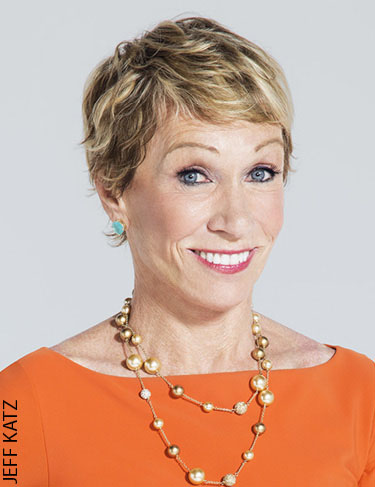 Shark Tank Appearance: Oct. 19, 2012
Shark Tank Appearance: Oct. 19, 2012
Investor: Barbara Corcoran
Deal: $55,000 for a 15 percent
Results: Total sales increased from $150,000 to more than $15 million.
The menu is simple at the 20 Cousins Maine Lobster food trucks in 13 cities across the U.S. Do patrons want their lobster rolls the classic Maine way—chilled with a touch of mayo? Or Connecticut style—served warm with butter and lemon?
For cousins Jim Tselikis and Sabin Lomac, who launched Cousins Maine Lobster in 2012 with a single truck in Los Angeles, growing their business has required some far tougher decision-making. Take, for starters, the choice of whether to watch their October 2012 appearance on Shark Tank in LA, where their business was based, or in Portland, Maine, where they both grew up and which provided inspiration for their company. In the end they chose Portland, “Where it all began,” says Tselikis. They watched along with 150 friends, family members, lobstermen and other suppliers on a giant screen at the Portland Regency Hotel.
Both Tselikis and Lomac had quit their jobs—Tselikis was selling medical devices while Lomac was in real estate—and Tselikis had relocated from Boston to LA. “This had started out as a passion project, something Sabin and I could do together,” Tselikis says. “For a small investment, we had a piece of Maine rolling down the streets of LA. We thought, If it made a little bit of money, that would be great. But once the Shark Tank producers reached out to us about being on the show, we understood this was an opportunity for the business to actually support the two of us.”
Related: How to Go From Employee to Entrepreneur
After their episode aired on ABC’s Emmy Award-winning reality show, Tselikis and Lomac were flooded with offers, which they evaluated with the savvy guidance of Barbara Corcoran, their Shark Tank investor. Did they want to open a location in this or that shopping mall? How about in an airport food court? “Barbara pointed out to us that not everything that comes your way is a good thing,” Tselikis says. “And that some of the hardest decisions are deciding not to do something.” Take the offer to bring their tasty crustaceans to the 2013 Grammy Awards. If photos of Taylor Swift or Beyoncé chowing down on a lobster roll went viral, it would be priceless publicity, Tselikis thought.
Corcoran provided a reality check. “We’d have to donate the food, some 500 or 600 servings, which was a lot for a bootstrapped startup,” Tselikis says. “Barbara pointed out, were A-listers really going to show up at an event for hundreds of people? It was more likely they’d head out a back door to a smaller affair. We decided to pass.”
By the beginning of 2014, the cousins had a fleet of four trucks in Southern California. But Corcoran was pressing for a bigger expansion plan. The future of their company, she insisted, was in franchising. “She brought it up at least 10 times over the next year,” Tselikis says. Finally, they saw the wisdom of her advice. “A franchisee is someone who has skin in the game,” Tselikis says, “rather than someone you hire to run a truck in another city and who might wake up hung-over on a Sunday and take shortcuts in cleaning or cooking or operations.”
Related: 5 Smart Tips for the New Entrepreneur
Instead of overseeing the franchising on their own, the cousins brought the Franchise Development Group on board. While FDG does the initial vetting of the thousands who express interest in purchasing a franchise, Tselikis and Lomac interview the promising candidates, first by phone or Skype and then through a “Discovery Day,” where the potential franchisees fly to LA and spend time on a truck.
Tselikis says their decisions on who will eventually be given the keys to a truck are a combination of gut feelings and analysis. “Jim and Sabin are great at making fast decisions,” Corcoran says. “A lot of important decisions had to be made on the heels of Shark Tank, and they were smart enough to make them quickly.” The cousins ask themselves three questions when they’re sizing up potential lobster peddlers:
1. Are they prepared? “I want to see evidence that they know the market and their competition,” Tselikis says. Bonus points if the would-be franchisees have already scoped out the most lucrative street corners to park their trucks.
2. Are they passionate? “This is a tiring business,” Tselikis says. “It requires the energy and motivation to work super-long days. I don’t feel confident that someone is a good fit unless they show a lot of interest in the product and want to know everything about it.”
3. Do they have sales skills? “Running a successful food truck requires strong sales and networking skills,” Tselikis says. “If there’s a big music festival taking place or a local brewery is hosting a block party, you want your truck there. That means building relationships.” The cousins look for prior sales experience or at the very least an outgoing personality.
Five more trucks will hit the road before the end of 2016, bringing the total fleet to 25. Next up: franchising brick-and-mortar restaurants. The cousins opened a West Hollywood shop in July 2015, giving a place of honor near the entryway to a photo of Corcoran, their mentor.
Related: The Art of Mentorship With Kevin O’Leary
This article originally appeared in the November 2016 issue of SUCCESS magazine.








